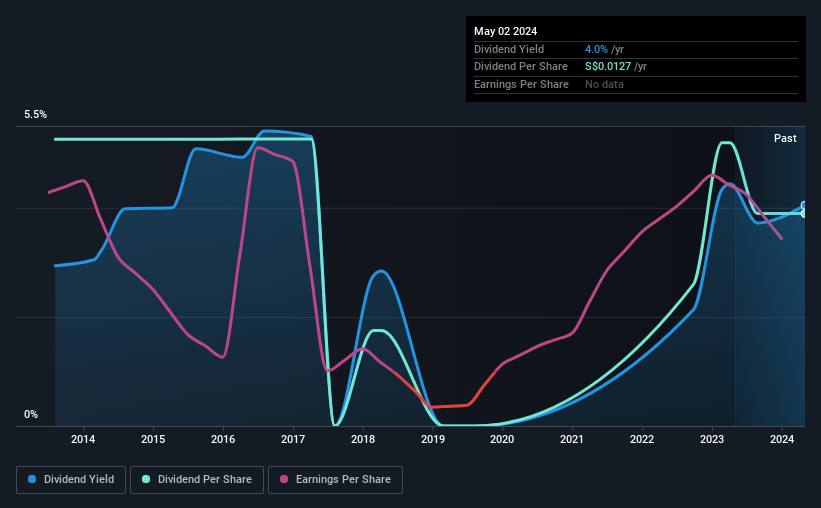- Singapore
- /
- Retail Distributors
- /
- SGX:BFU
Income Investors Should Know That Tye Soon Limited (SGX:BFU) Goes Ex-Dividend Soon
It looks like Tye Soon Limited (SGX:BFU) is about to go ex-dividend in the next four days. The ex-dividend date is one business day before the record date, which is the cut-off date for shareholders to be present on the company's books to be eligible for a dividend payment. The ex-dividend date is of consequence because whenever a stock is bought or sold, the trade takes at least two business day to settle. In other words, investors can purchase Tye Soon's shares before the 8th of May in order to be eligible for the dividend, which will be paid on the 17th of May.
The company's upcoming dividend is S$0.0085 a share, following on from the last 12 months, when the company distributed a total of S$0.013 per share to shareholders. Based on the last year's worth of payments, Tye Soon has a trailing yield of 4.0% on the current stock price of S$0.315. Dividends are an important source of income to many shareholders, but the health of the business is crucial to maintaining those dividends. So we need to check whether the dividend payments are covered, and if earnings are growing.
View our latest analysis for Tye Soon
If a company pays out more in dividends than it earned, then the dividend might become unsustainable - hardly an ideal situation. That's why it's good to see Tye Soon paying out a modest 26% of its earnings. Yet cash flow is typically more important than profit for assessing dividend sustainability, so we should always check if the company generated enough cash to afford its dividend. Tye Soon paid a dividend despite reporting negative free cash flow last year. That's typically a bad combination and - if this were more than a one-off - not sustainable.
Click here to see how much of its profit Tye Soon paid out over the last 12 months.

Have Earnings And Dividends Been Growing?
Stocks in companies that generate sustainable earnings growth often make the best dividend prospects, as it is easier to lift the dividend when earnings are rising. Investors love dividends, so if earnings fall and the dividend is reduced, expect a stock to be sold off heavily at the same time. It's encouraging to see Tye Soon has grown its earnings rapidly, up 52% a year for the past five years.
Another key way to measure a company's dividend prospects is by measuring its historical rate of dividend growth. Tye Soon's dividend payments per share have declined at 2.9% per year on average over the past 10 years, which is uninspiring. Tye Soon is a rare case where dividends have been decreasing at the same time as earnings per share have been improving. It's unusual to see, and could point to unstable conditions in the core business, or more rarely an intensified focus on reinvesting profits.
To Sum It Up
Has Tye Soon got what it takes to maintain its dividend payments? We're glad to see the company has been improving its earnings per share while also paying out a low percentage of income. However, it's not great to see it paying out what we see as an uncomfortably high percentage of its cash flow. While it does have some good things going for it, we're a bit ambivalent and it would take more to convince us of Tye Soon's dividend merits.
While it's tempting to invest in Tye Soon for the dividends alone, you should always be mindful of the risks involved. Be aware that Tye Soon is showing 5 warning signs in our investment analysis, and 1 of those is significant...
A common investing mistake is buying the first interesting stock you see. Here you can find a full list of high-yield dividend stocks.
Valuation is complex, but we're here to simplify it.
Discover if Tye Soon might be undervalued or overvalued with our detailed analysis, featuring fair value estimates, potential risks, dividends, insider trades, and its financial condition.
Access Free AnalysisHave feedback on this article? Concerned about the content? Get in touch with us directly. Alternatively, email editorial-team (at) simplywallst.com.
This article by Simply Wall St is general in nature. We provide commentary based on historical data and analyst forecasts only using an unbiased methodology and our articles are not intended to be financial advice. It does not constitute a recommendation to buy or sell any stock, and does not take account of your objectives, or your financial situation. We aim to bring you long-term focused analysis driven by fundamental data. Note that our analysis may not factor in the latest price-sensitive company announcements or qualitative material. Simply Wall St has no position in any stocks mentioned.
About SGX:BFU
Tye Soon
Imports, exports, and distributes automotive spare parts in Singapore, Malaysia, Australia, Thailand, Indonesia, Hong Kong/China, South Korea, and internationally.
Established dividend payer and good value.
Similar Companies
Market Insights
Community Narratives



